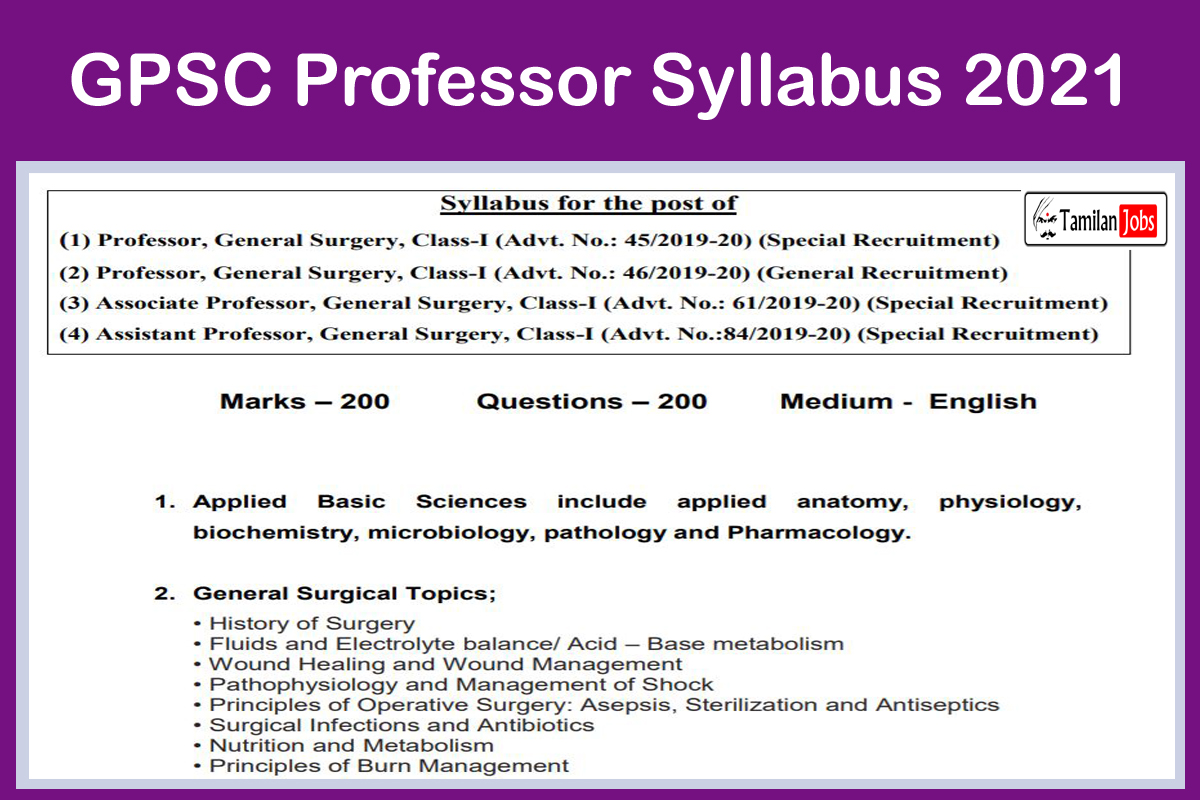GPSC Professor Syllabus 2021 Out @ gpsc.gujarat.gov.in | Check Here: The Gujarat Public Service Commission has released the Syllabus and Exam Pattern @ gpsc.gujarat.gov.in. Many applicants have applied for the written examination for the post of Professor, Associate Professor, Assistant Professor. Applicants keep checking this article for Exam Date Details. The higher authority of GPSC has announced the Exam Date at the gpsc.gujarat.gov.in. For the sake of candidates, We have inserted the direct download link below.
GPSC Assistant Professor Syllabus 2021 – Complete Information

| GPSC Professor, Assistant Professor Syllabus 2021 PDF & Exam Pattern @ gpsc.gujarat.gov.in | |
| Organization | Gujarat Public Service Commission (GPSC) |
| Post Name | Professor / Associate Professor / Assistant Professor |
| Exam Date | Announced Soon |
| Status | Available Now |
| Category | Syllabus |
| Official Site | gpsc.gujarat.gov.in |
GPSC Assistant Professor Exam Pattern
| Subject | Questions | Marks | Medium |
| 1. General Surgical Topics
2. Peri-Operative Management 3. TRAUMA 4. Intensive Care & Others |
200 | 200 | English |
GPSC Assistant Professor Syllabus
- Applied Basic Sciences include applied anatomy, physiology, biochemistry, microbiology, pathology, and Pharmacology.
- General Surgical Topics
- History of Surgery
- Fluids and Electrolyte balance/ Acid-Base metabolism
- Wound Healing and Wound Management
- Pathophysiology and Management of Shock
- principles of Operative Surgery: Asepsis, Sterilization, and Antiseptics
- Surgical Infections and Antibiotics
- Nutrition and Metabolism
- Principles of Burn Management
- Principles of Oncology
- Principles of Laparoscopy and Endoscopy
- Hemostasis, Blood Transfusion
- Trauma: Assessment of polytrauma, triage, basic and advanced trauma
- Basic Principles of Anesthesia
- Informed Consent and Medicolegal Issues
- Organ Transplantation
- Molecular Biology and Genetics
- Hernias: Types of hernias, repair techniques
- Breast Diseases: Benign breast disorders, investigations, screening, genetics, Breast Cancer
- Thyroid Disorders: Solitary nodule, investigations, multinodular goiter, Graves disease, malignancies
-
PERI-OPERATIVE MANAGEMENT – 1
- Pre-operative Management
- Infection
- Investigative and Operative Procedures
- Anesthesia
- Theatre Problems
-
PERI-OPERATIVE MANAGEMENT – 2
- Skin and Wounds
- Fluid Balance
- Blood
- Postoperative Complications
- Post-operative Sequelae
5. TRAUMA
- Initial Assessment and Resuscitation after Trauma
- Chest, Abdomen, and Pelvis
- Central Nervous System Trauma
- Special Problems
- Principles of Limb Injury
6. INTENSIVE CARE
- Cardiovascular
- Respiratory
- Multisystem Failure
- Problems in Intensive Care
- Principles of ICU
7. NEOPLASIA: TECHNIQUES AND OUTCOME OF SURGERY
- Principles of Oncology
- Cancer Screening and Treatment
- Techniques of Management
- Ethics and the Law
- Outcome of Surgery
8. LOCOMOTOR SYSTEM
Musculoskeletal Anatomy and physiology are relevant to the clinical examination of the locomotor system and to the understanding of disordered locomotor function, with emphasis on the effects of acute musculoskeletal trauma.
- Effects of Trauma and Lower Limb
- Infections and Upper Limb
- Bone Disease and Spine
9. VASCULAR
The surgical anatomy and applied physiology of blood vessels relevant to clinical examination, the interpretation of special investigations, and the understanding of the role of surgery in the management of cardiovascular disease
- Arterial Diseases
- Venous Diseases
- Lymphatics and Spleen
10. ABDOMEN
The surgical anatomy of the abdomen and its viscera and the applied physiology of the alimentary system is relevant to clinical examination, the interpretation of common special investigations, the understanding of disorders of function, and the treatment of abdominal disease and injury.
- Abdominal Wall
- Abdominal injury
- Acute Abdominal Conditions
11. SMALL BOWEL AND COLORECTAL DISORDERS
- Neoplasms of the large bowel
- Inflammatory bowel disease (inc. medical management)
- Diverticular disease
- Irritable bowel syndrome
- Hemorrhoids
- Anal fissure
- Rectal prolapse
- Acute appendicitis/RIF pain
- Intestinal obstruction
- Intestinal pseudo-obstruction
- Intestinal ischemia
- Peritonitis
- Large bowel and rectal injuries
- Anal tumors
- Pelvic autonomic nerves
- Screening for colorectal cancer
- Genetics of colorectal cancer
- Place of radiotherapy and chemotherapy in the treatment
- Anorectal physiology
- Anorectal ultrasound
- Fecal incontinence
- Chronic constipation
- Intestinal fistulae
- Colonic bleeding
- Radiation enterocolitis
- Other small bowel conditions
- Colonic obstruction
- Colonic perforation
12. LAPAROSCOPIC SURGERY
- Laparoscopic anatomy of the abdomen
- Diagnostic laparoscopy
- Physiology of pneumo-peritoneum Dangers of pneumoperitoneum
- Principles of diathermy
- Informed consent for laparoscopic procedures
- Pre and post-operative management of laparoscopic cases
- Port complications
- The technology of video imaging, cameras, insufflator,s, etc.
- The methods of manipulation of images
- Laparoscopic instruments, clips, staplers, and port types
- Management of equipment failure
- Ultrasound interpretation, internal and external techniques
- Recognition and management of laparoscopic complications
- Use and dangers of diathermy
- Anesthetic problems in laparoscopic surgery
- Medico-legal implications of video-endoscopic surgery
- Theory and practice of choledochal-scope
- Theory of different forms of diathermy
- Laparoscopic ultrasound
- Advanced instrumentation and equipment
- Endoscopic suturing devices
- Theory, uses and dangers of lasers and other energy sources e.g. harmonic scalpel
- Creation and maintenance of new endoscopic spaces
- Use of assistance robots and robotic instruments
13. TRANSPLANTATION with special reference to RENAL AND HEPATIC DISEASE
- Pathology of renal and hepatic disease
- Pathophysiology of renal and hepatic failure
- Peritoneal- and haemo-dialysis
- Management of fluid and electrolyte disorders
- Selection of patients for transplantation
- Post-operative management
- Immuno-pathology of rejection
- Management of rejection
- Immunosuppression
- Opportunist infections
- Immunosuppression and cancer
- Transmission of viral and fungal diseases
- Tissue typing
- The HLA system
- Bladder dysfunction
14. HEPATOPANCREATOBILIARY SURGERY
- Gallstones and complications
- Biliary stricture
- Obstructive Jaundice
- Neoplasms of the Liver, Biliary Tract, and Pancreas
- Pancreatitis, acute and chronic, complications
- Liver injuries
- Portal Hypertension
- Hydatid disease
- ESRD and Liver transplantation
15. UPPER GI TRACT
- Neoplasms of the upper GI tract
- Management of perforations of the upper GI tract
- Management of intestinal obstruction
- Management of GI bleeding
- Oesophageal motility disorders
- Oesophageal Strictures
- Gastro-oesophageal reflux and its complications
- Peptic ulceration and its complications
- Radiation enteritis
- Abdominal trauma
- Principles of screening for cancer
- The use and limitations of multimodality treatment for upper GI cancer
- Oesophageal motility disorders
- Other small bowel conditions
- Principles of Small bowel resection
- Sutured and stapled anastomoses
- Urinary Tract
- Urinary tract infection.
- Urinary Tract Obstruction
- Haematuria.
- Trauma to the urinary tract.
- Urinary calculi.
- Retention of urine.
- Urinary tract Neoplasms
- Disorders of the prostate.
- Pain and swelling in the scrotum.
- Other Scrotal Lesions
- Testicular Neoplasms
16. NEUROSURGERY
- Cranial, spinal, and peripheral nerve tumors
- Head Injury
- Spinal and peripheral nerve injuries
- Hydrocephalus
- Cerebrovascular Accidents
- Infections
- Recent advances
17. Cardiac and Thoracic Surgery
- Myocardial revascularisation Valvular Disorders
- Peripheral vascular disease
- Renovascular disease
- Secondary Hypertension
- Inflammatory Lung Disease
- Chest Wall lesions
- Thoracic Neoplastic Disease
- Chest Trauma
- Pleural Diseases
GPSC Assistant Professor Syllabus 2021 – Click Here (Available Now) ![]()
FAQ On GPSC Assistant Professor Syllabus 2021
Yes, It is released.
You can access the GPSC Assistant Professor Syllabus 2021 from the below direct link. Is GPSC Assistant Professor Syllabus 2021 released?
How can I access GPSC Assistant Professor Syllabus 2021?

